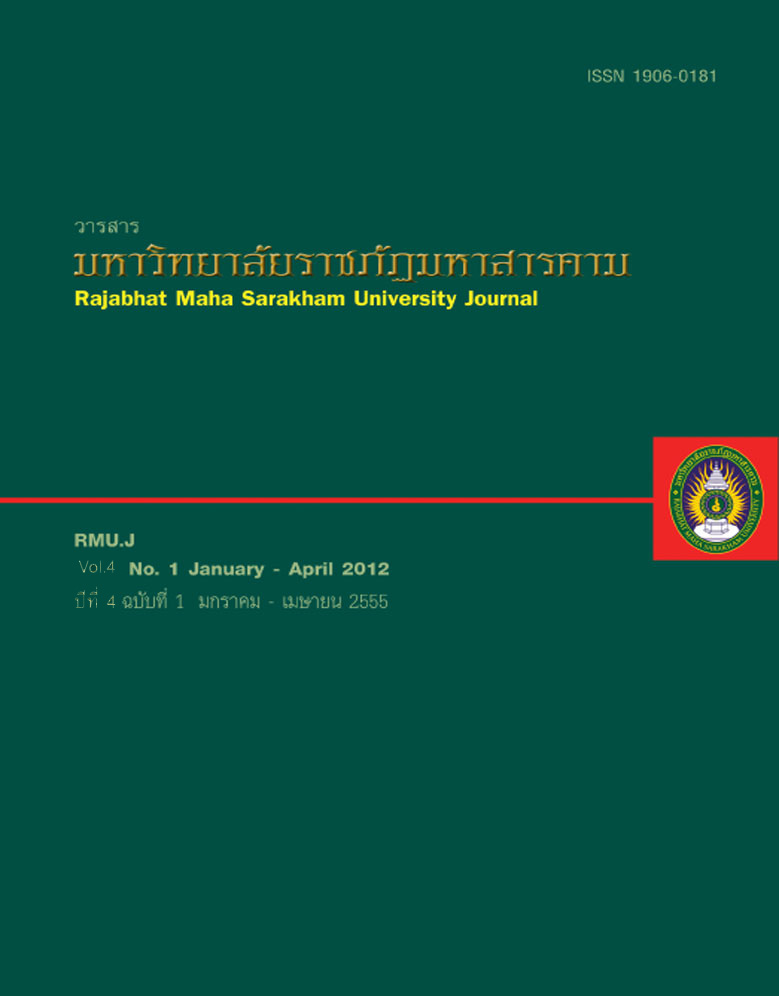การพัฒนารูปแบบการเรียนการสอนศูนย์พัฒนาเด็กเล็ก องค์กรปกครองส่วนท้องถิ่น โดยใช้ภูมิปัญญาท้องถิ่น Development of a Teaching Model for Child Care Centers under Local Government Organization : Practices of Local Wisdom
Main Article Content
บทคัดย่อ
การวิจัยครั้งนี้ มี
วัตถุประสงค์ ประการแรกเพื่อศึกษาสภาพการจัดการเรียนการสอนของศูนย์พัฒนาเด็กเล็ก องค์กรปกครองส่วนท้องถิ่น ในเขตจังหวัดมหาสารคาม และประการที่สองเพื่อพัฒนารูปแบบการเรียนการสอนศูนย์พัฒนาเด็กเล็ก
องค์กรปกครองส่วนท้องถิ่น โดยใช้ภูมิปัญญาท้องถิ่นในเขตจังหวัดมหาสารคาม การวิจัยแบ่งเป็น 3 ระยะ คือระยะที่ 1การศึกษาและวิเคราะห์สภาพความต้องการจำเป็น ดำเนินการโดย
1) การศึกษาวิเคราะห์สภาพปัญหาและความจำเป็นในการ
จัดการเรียนการสอน
2) จัดการประชุมเพื่อระดมความคิดเห็นเกี่ยวกับสภาพปัญหาและความต้องการในการจัดการเรียนการสอนศูนย์พัฒนาเด็กเล็กจากผู้ดูแลเด็ก
3) การสนทนากลุ่ม (Focus group) เพื่อศึกษาสภาพปัญหาและหารูปแบบการเรียนการสอนจากผู้เกี่ยวข้อง พบว่า ปัญหาด้านการบริหารงาน ด้านสถานที่ ด้านการบริการ ด้านบุคลากร ด้านงบประมาณ และด้านการบริหาร
จัดการ รูปแบบการเรียนการสอนควรใช้สื่อการเรียนการสอนจากวัสดุตามธรรมชาติในท้องถิ่น จัดกิจกรรมตามวันสำคัญของท้องถิ่น และให้ท้องถิ่นได้เข้ามามีส่วนร่วมในการจัดกิจกรรม เป็นต้น ระยะที่ 2 การสร้างและพัฒนารูปแบบการสอน ดำเนินการ
โดยได้ร่างรูปแบบการเรียนการสอน ประกอบด้วยหลักการของรูปแบบ สาระการเรียนรู้ การจัดประสบการณ์เรียนรู้ และการประเมินพัฒนาการเด็ก ประเมินความเหมาะสมของรูปแบบการเรียนการสอนอยู่ในระดับมากที่สุด ระยะที่ 3 การทดลองใช้
รูปแบบการเรียนการสอนและเผยแพร่รูปแบบการเรียนการสอน โดยนำรูปแบบการเรียนการสอนที่ได้มาอบรมเชิงปฏิบัติการให้กับผู้ดูแลเด็ก 150 คน แล้วนำรูปแบบการเรียนการสอนไปทดลองใช้กับเด็กปฐมวัย ด้วยกระบวนการวิจัยเชิงทดลอง ผลการวิจัย
พบว่าค่าเฉลี่ยของคะแนนจากการสังเกตพัฒนาการของเด็กก่อนและหลังการจัดด้วยรูปแบบการสอน แตกต่างกันอย่างมีนัยสำคัญทางสถิติที่ระดับ .01 แล้วนำรูปแบบการสอนไปเผยแพร่แก่ผู้ดูแลเด็กในศูนย์พัฒนาเด็กเล็กต่างๆ ผู้ดูแลเด็กแสดง ความคิดเห็นว่ารูปแบบการสอนมีความเหมาะสมในระดับมากที่สุด แล้วจัดอบรมให้ผู้ปกครองเรื่อง ”การพัฒนาเด็กปฐมวัยด้วยภูมิปัญญาไทย„ พบว่าผู้ปกครองมีความรู้ในการอบรมเลี้ยงดูบุตรหลานโดยใช้ภูมิปัญญาท้องถิ่นเพิ่มมากขึ้น และจะนำความรู้ที่ได้ไปใช้อบรมเลี้ยงดูบุตรหลานที่บ้านต่อไป
The objectives of the research were to analyze instructional conditions of child care centers
under the local government organization in Maha Sarakham Province, and to develop an instructional
model for child care centers by using local wisdom. The study was divided into 3 phases: Phase I: Need
Analysis comprising 1) analysis of instructional management, 2) organizing meetings to brain storm
opinions regarding instructional problems and needs of child care centers, and 3) focus-group
discussion for problem analysis and seeking an efficient instructional model. Analyses revealed
problems regarding administration, buildings, services, personnel, budgets and management. With
regard to the instructional model, it was concluded that the teaching materials should be made from
local natural materials; activities on local special days should be organized, and these should involve
the community. Phase II: Instructional Design and Development that consisted of principles of
instructional model development, learning contents, learning experience management, and child
development evaluation. Evaluation of the instructional model revealed that its appropriateness was
found at the highest level. Phase III: Try-out of the Model and Dissemination by using the instructional
model with a training workshop for 150 caretakers, before it was later used in an experiment with a
group of pre-school children. Findings indicated that the average levels of the children’s development
before and after learning with the instructional model were significantly different at the .01 level. The
model was later introduced to other child care centers, and it was found that the average opinion of the
caretakers on the model was very high. Then a training on “Childhood Development with Local Wisdom”
was organized for the parents, and the results showed that the parents gained more knowledge on
raising children with local wisdom, which they would further apply in raising their own children at home.
Article Details
1. บทความที่ลงตีพิมพ์ทุกเรื่องได้รับการตรวจทางวิชาการโดยผู้ประเมินอิสระ ผู้ทรงคุณวุฒิ (Peer Review) สาขาที่เกี่ยวข้อง อย่างน้อย 3 ท่าน ในรูปแบบ Double blind review
2. ข้อคิดเห็นใด ๆ ของบทความที่ลงตีพิมพ์ในวารสารมหาวิทยาลัยราชภัฏมหาสารคาม นี้เป็นของผู้เขียน คณะผู้จัดทำวารสารไม่จำเป็นต้องเห็นด้วย
3. กองบรรณาธิการวารสารมหาวิทยาลัยราชภัฏมหาสารคาม ไม่สงวนสิทธิ์การคัดลอกแต่ให้อ้างอิงแสดงที่มา


